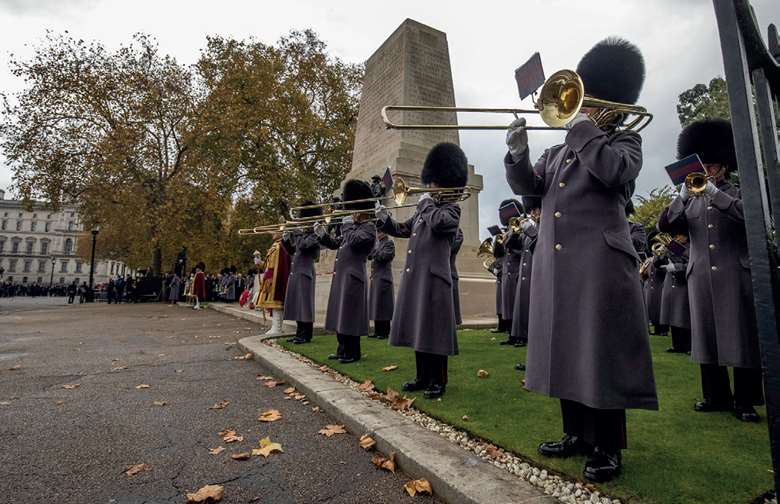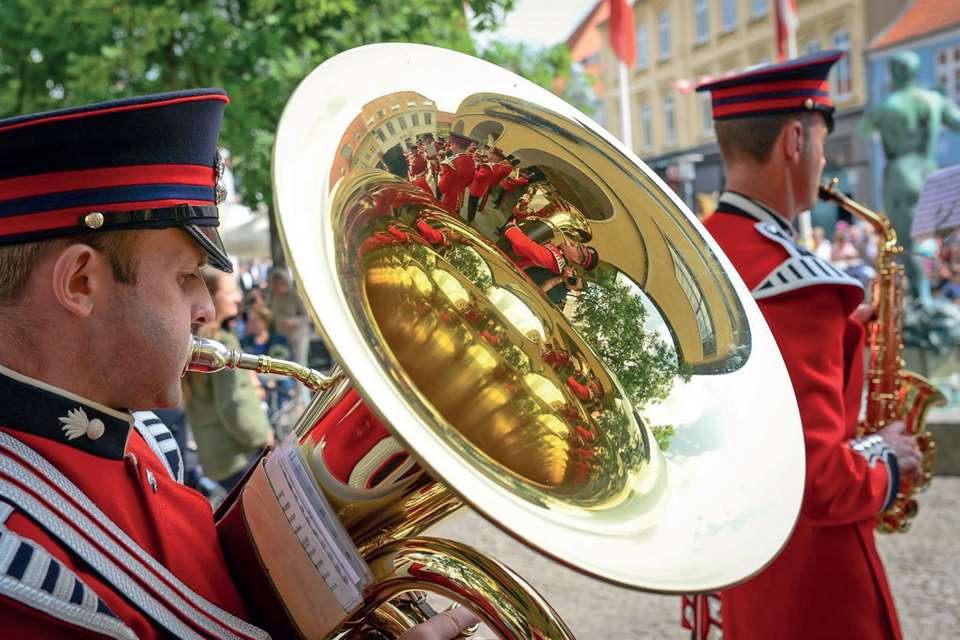Q&A: Band Sergeant Major Naomi Phelan
Music Teacher
Sunday, October 1, 2023
With Remembrance Sunday approaching, MT meets Band Sergeant Major (Warrant Officer Class Two) Naomi Phelan of the Band of the Scots Guards as they prepare to play at the Cenotaph.

MOD Crown Copyright
The Band of the Scots Guards has been around since 1716 and today is 45 strong. Based at Wellington Barracks, London, it fulfils public and ceremonial engagements from State Visits to Trooping the Colour, and on 12 November will form part of the Remembrance ceremony in Whitehall.
Phelan joined the band in 2002 after attending the Guildhall School of Music & Drama. She is a visiting music teacher at Marlborough College and tutor for the National Schools Symphony Orchestra.
MT: What is your role within the band?
NP: I am a double-bass player and play oboe when on the march. As Band Sergeant Major, I am responsible for the musicians, overseeing the workforce to ensure that we have the correct number and instrumentation for every engagement, while managing logistics, discipline and welfare.
MT: What is the training for a musician?
NP: There is a wide range of qualifications among musicians joining Army Music. Some have degrees, some join straight from school, but the most important factor is the potential they demonstrate. Full training is provided. There are opportunities, training and funding to gain qualifications to diploma or degree level while working.
MT: Besides ceremonial duties, what musical activities are there?
NP: In addition to public duties, we perform in concerts, recitals and masterclasses. The Army also has wind bands, brass bands, an orchestra and contemporary groups which keep us busy. External music engagements are also encouraged, and we have personnel who perform regularly in professional orchestras and championship brass bands.
MT: What music does the main band play?
NP: We play a wide range of music from Handel to Coldplay! We cover all genres and there is plenty of variety, with pieces re-arranged for particular events.
MT: What does playing for Remembrance Sunday involve (and mean) for you?
NP: The national act of Remembrance is the most poignant ceremonial engagement of the year, and music plays an integral part of the parade. It is a privilege to play as up to 10,000 veterans and their families march past. My Grandad was a Dunkirk veteran and my dad served as an Army musician, so it is the most important engagement of the year for me.
MT: What are the musical high-points of Remembrance Sunday?
NP: The music is reflective, naturally, and includes Beethoven’s Funeral March, as recently played for Her Late Majesty’s funeral, and the beautiful Nimrod by Elgar. The latter is always a special moment for the massed bands.
MT: What are your thoughts on today’s music education and how younger musicians are prepared?
NP: The cuts in funding for the arts are having a big impact on our potential future musicians. Regional youth orchestras provide essential training grounds, but these vary considerably from county to county, due to resources. I feel the lack of one-to-one tuition in some schools is having a direct impact on the standards reached by school-leaving age. Unfortunately, instrumental music education is becoming siloed, with some not having an opportunity to make music at an advanced level.
MT: What music would you recommend to teachers wishing to mark Remembrance in schools?
NP: It would be useful to educate pupils on the Last Post – its history and relevance to the act of Remembrance, in time for Armistice Day. It helps to frame the two-minute silence and emphasises the importance of reflecting on the sacrifice of others. It could be adapted to be played on any instrument in a school setting.
- Royal British Legion: tinyurl.com/4sddcka6
- Royal Corps of Army Music: tinyurl.com/58h6kvzm
- The Household Division: tinyurl.com/samt4uud



